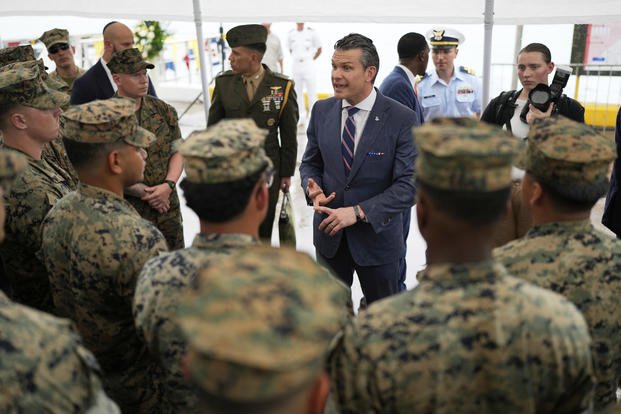Troops Booted over COVID-19 Vaccine Are Being Offered Back Pay But Not Huge Payouts

The Pentagon, acting on orders from President Donald Trump, has begun to lay out the details of its plan to woo back thousands of service members who were involuntarily discharged over their refusal to receive the COVID-19 vaccination.
Tim Dill, the Pentagon's current head of Personnel and Readiness, said Tuesday that both Trump and Defense Secretary Pete Hegseth have shared their "eagerness to welcome back these former service members to the military."
Troops who were booted over refusing the vaccines have been able to return to service since 2023, though just over 100 out of more than 8,000 did so. But the new policies, which come a few months after an executive order issued by Trump, offer the promise of back pay[1] and an easier medical screening -- though with a caveat of yearslong military commitments and some major administrative hurdles.
Read Next: Toxic Exposure at Domestic Military Bases Is Next Step After PACT Act, Democratic Lawmakers Say[2]
According to Dill, who spoke with reporters, both Trump and Hegseth "have publicly expressed and signed documents welcoming former service members impacted by this policy to return in a way that those former service members were not encouraged in the past."
The highlight of the new policies is mainly an opportunity for a returning service member to receive back pay for the time that they were out of the service. However, Dill noted that the idea behind the policy was not to offer a bonus or benefit but rather make the person "stand financially in the same position they would have stood in had they never been discharged."
Most of the services were quick to push out messages on social media announcing the new policy[3] offering the possibility of back pay, and the Army[4] even bragged that "about 150 soldiers"[5] had taken some step toward rejoining.
However, only the Navy[6] publicly offered insight[7] into how that process would work.
According to Navy documents made public Monday[8], a sailor interested in being reinstated is entitled to back pay but minus anything they've earned while out of the military -- and that is contingent on a four-year commitment[9].
The document explains that what leaders like Trump have called "full back pay" will actually be a "financial benefit" that will consider all the basic pay, food and housing allowances, and bonuses to come up with a sum.
Then, the service will deduct from that figure any wages that were earned by the service member while they were separated, as well as any VA disability payments[10], among other payouts.
All of the information would come from tax documents and pay stubs that would need to be submitted as part of the process, the Navy document said.
The resulting figure -- one that will vary widely from person to person -- would then be offered to the service member ahead of their decision to return or not. It would be paid out in a lump sum or quarterly payments but be subject to federal and state taxes.
Meanwhile, service members interested in returning under the new policy should have an easier time passing the medical screening, which, according to Dill, would hold them to the easier "retention" standard instead of the normal "accession" one.
"Initial accession ... that is the highest medical requirement, because that is the department's first take at assessing whether or not this is someone in whom the department wishes to invest significant time and resources," Dill said.
However, the retention standard acknowledges a previous investment of time and resources and simply looks to determine whether a service member is "suitable to continue in service."
"We've long used two different thresholds for those timings," Dill added.
While the new policy appears to add more incentive for some troops to return, it's not clear how much of an effect it will make on people who have now been out of the military for years and may have been using the vaccine as an opportunity to simply leave the service early.
From 2023 to shortly before Trump signed the executive order, only 113 of the more than 8,000 involuntarily discharged service members had chosen to return to military service. According to data provided by the services, 73 soldiers, 25 Marines, 13 airmen or Guardians, and two sailors have come back.
Since the order, when the possibility of back pay was raised but not caveated by other conditions or administrative burdens, those figures don't appear to have increased significantly.
The Associated Press reported that the Army has reenlisted more than 23 soldiers[11] in that period -- all but three people rejoined either the National Guard[12] or the Army Reserve.
On Tuesday, Capt. Candice Tresch said that the Navy's number of returnees, which includes reservists, had grown to 10 -- just 8 more since Trump took office.
The Marine Corps[13] told Military.com that, while 40 Marines have completed the initial questionnaire -- the first step in the reinstatement or reaccession process, so far none has actually been reinstated.
Meanwhile, Dill said that the first group of just over 100 service members, who returned without any incentive, will not be able to benefit from the new back pay policy.
"The department is also grateful for their decision to return," he said but added that "there is not currently a mechanism that we have provided for them to put in for the same calculations that we're doing for those that would return today."
Anyone interested in returning has until April 1, 2026, to seek reinstatement.
-- Drew F. Lawrence contributed to this report.
Related: Trump Order on Back Pay for Vaccine Refusers Raises Questions, Offers No Clear Path Forward[14]
© Copyright 2025 Military.com. All rights reserved. This article may not be republished, rebroadcast, rewritten or otherwise distributed without written permission. To reprint or license this article or any content from Military.com, please submit your request here[15].
